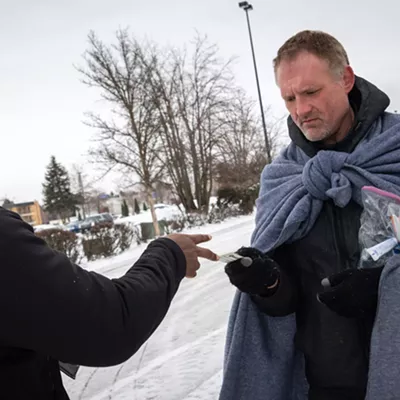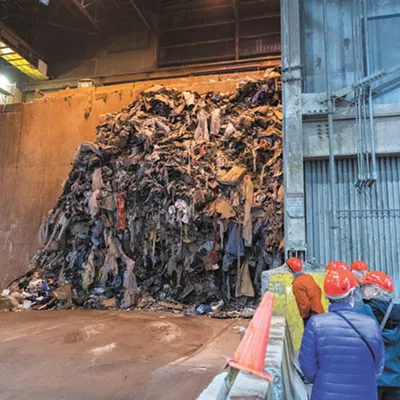NAACP and community groups urge Spokane Valley to pass racial equity policy, citing institutional racism
[
{
"name": "Broadstreet - Instory",
"component": "25846487",
"insertPoint": "4",
"requiredCountToDisplay": "4"
},{
"name": "Broadstreet - Empower Local",
"component": "27852456",
"insertPoint": "8",
"requiredCountToDisplay": "8"
},{
"name": "Broadstreet - Instory",
"component": "25846487",
"insertPoint": "12",
"requiredCountToDisplay": "12"
},{
"name": "Broadstreet - Instory - 728x90 / 970x250",
"component": "27852677",
"insertPoint": "18",
"requiredCountToDisplay": "18"
},{
"name": "Broadstreet - Instory",
"component": "25846487",
"insertPoint": "5th",
"startingPoint": "23",
"requiredCountToDisplay": "24",
"maxInsertions": 100
}
]
Roughly two weeks ago, elected leaders at a Spokane Valley City Council meeting generated controversy after rebuffing a proposed racial equity policy, arguing that it was unnecessary and that there isn't racism in Spokane Valley. Now, the NAACP and other community groups are calling on officials to adopt it, citing the reaction as "all the more reason" to pass it.
At the July 23 meeting, council member Linda Thompson pitched developing a racial equity policy for the city in the run-up to a meeting with Spokane Valley officials, the NAACP and Republican Congresswoman Cathy McMorris Rodgers on racial issues, per the Spokesman-Review.
However, her fellow legislators shot her down. Spokane Valley Mayor Rod Higgins cited a "inclusive city" resolution from 2017 in arguing that the city doesn't need a racial equity policy. Council member Arne Woodard, meanwhile, said that friends of his who are minorities purportedly told him that they don't feel racism in Spokane valley: "We're trying to make a problem where there isn't one," Woodard said. "Everyone of them said it was great place to live."
Spokane Valley is 91 percent white, 5 percent Latino, 1 percent black, 1 percent Native American, and just under 2 percent Asian, according a 2018 U.S. Census Bureau estimate.
Additionally, Woodard, who is white, also reportedly referred to minorities as "not us" at the meeting: “We have a fabulous community, and we have a lot of ethnic groups that look like all of us up here on the council,” Woodard said, according to the Spokesman-Review. “They’re light skinned, but they are not us, and they feel comfortable.”
In a statement released on Aug. 5, the "Spokane Coalition of Color," which is composed of representatives from the NAACP, the Hispanic Business/Professional Association, and the Spokane Chapter of the Asian Pacific Islander Coalition, decried the response to the proposal from some Spokane Valley elected leaders. They also urged them to more forward with a policy, citing historic systemic discrimination and racism against minorities in the United States.
"A common refrain in Spokane is that racism isn’t a problem. It is. Those who think otherwise fail to recall that federal, state, and local policies influenced the region’s demographic composition," the statement reads. "We are living on Native American land. Their removal and the subsequent transfer of their land to white settlers essentially privileged the outlaws and impoverished the stewards."
"Housing and employment discrimination plagued the African American community ever since they settled in Spokane in the late 1800s. That discrimination continues to this day," the statement continues. "The Chinese Exclusion Act limited the number of Asian Americans who settled in the region. Anti-Chinese leagues set up by white settlers in the early 1900s made the region hostile to them."
The coalition also cited the practice of redlining — a racist practice where banks and insurance companies and the federal government refused to finance loans and mortgages for minority home buyers in certain parts of cities, effectively creating "whites only" neighborhoods — and racially discriminatory covenants on property deeds as evidence of historic racism with lasting repercussions.
"The impacts of such restrictions are still very relevant and very real," the statement says. "They need to end."
The coalition also voiced support for working with Spokane Valley leaders and other community groups on drafting the racial equity policy, and slammed officials who downplay racism:
"When city officials denigrate people of color’s lived experiences, they are speaking out of turn. When city officials downplay the presence of people of color in the community, they are making themselves look out of touch with reality," the statement reads. "We challenge them and everyone in Spokane to do better."





















